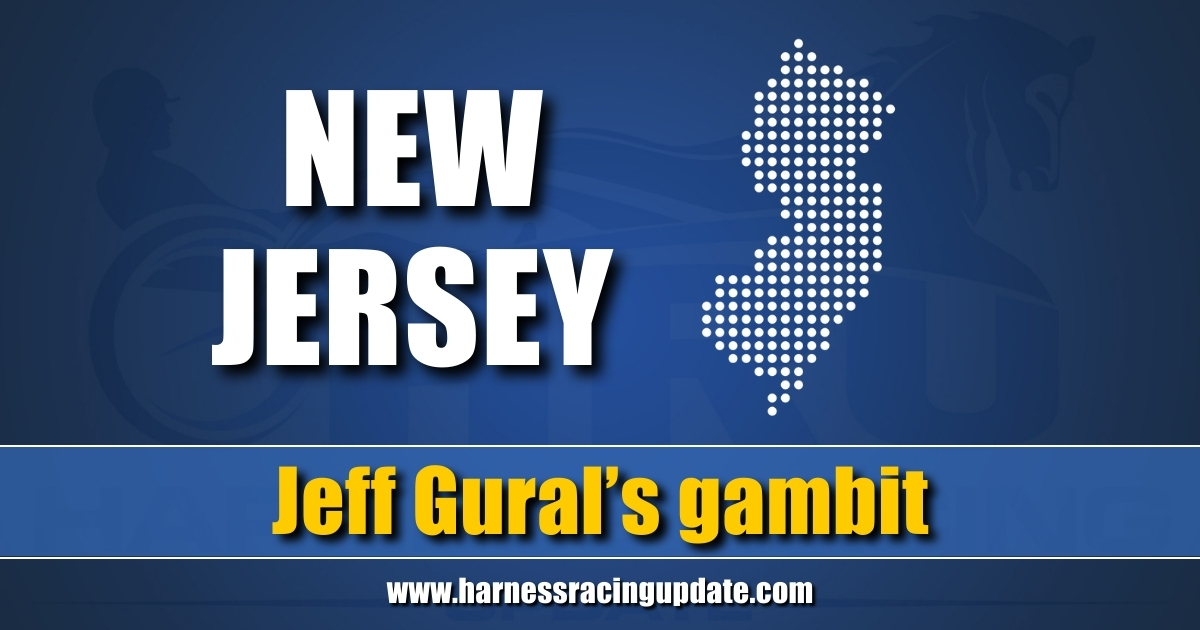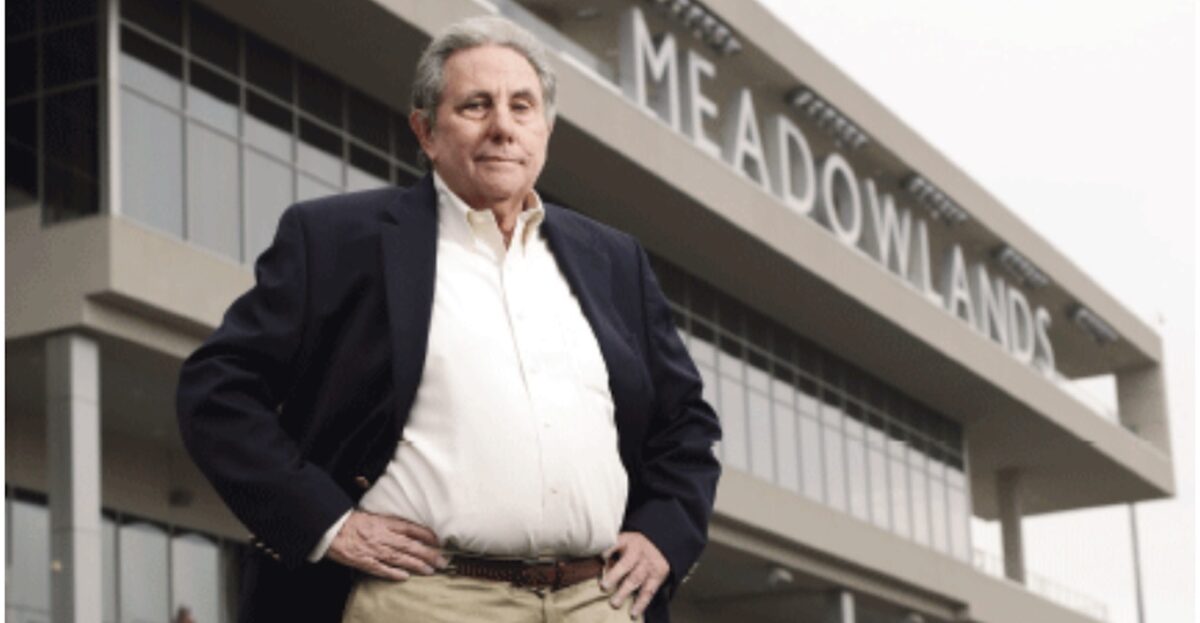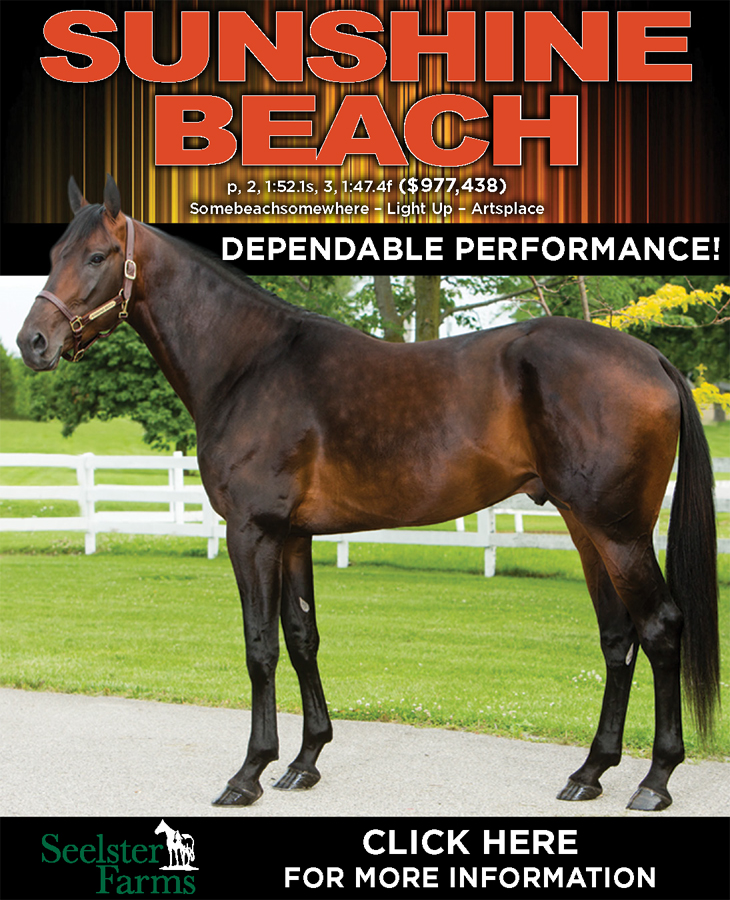

Jeff Gural’s gambit
The Meadowlands’ exclusion list confronts performance-enhancing drug issue.
by Melissa Keith
Jeff Gural said he knows he’s not the most popular man in harness racing. On Dec. 1, he became even less popular with 32 people immediately excluded from racing horses at The Meadowlands.
Although initially announced Nov. 3, a Meadowlands’ media release stated that the ban would take effect Dec. 1, “to avoid any appearance of conflict or impropriety” during November if Gural’s own horses competed against those of listed trainers/owners in late-season stakes events. The release stated that the exclusions will continue indefinitely, until the track has completed its own internal investigation into trial exhibits from the U.S. Attorney for the Southern District of New York office, released to the track upon request.
On Monday (Dec. 11), prominent standardbred owner and lawyer Howard Taylor filed a lawsuit against Gural with the U.S. District Court for the Eastern District of Pennsylvania, alleging “assault, libel and slander.”
On Tuesday (Dec. 12), Chicago PR firm Cozen O’Connor Public Strategies issued a brief press release saying that later on the day The Meadowlands issued its release on Nov. 3, “Gural was quoted in Thoroughbred Racing News saying that Taylor, ‘had to be giving EPO [Epogen] to his trainers to use and not a single trainer picked up the phone and said I have an owner who wants me to use EPO on his horses.’ That statement was untrue. No facts, in either The Meadowlands’ press release or the article, supported the claim that Taylor ever gave Epogen to any of his trainers or that Taylor ever instructed any trainer to use Epogen on his horses.
“The lawsuit is captioned Howard Taylor v. Jeffrey Gural and it was filed in federal court in the Eastern District of Pennsylvania.”
Taylor is one of the names on the list of individuals named for purchasing specific performance-enhancing drugs (PEDs) from former veterinary medication saleswoman Lisa Gianelli. Others had their horses testing positive for PEDs in blood tests conducted by the FBI and analyzed by the Hong Kong Jockey Club’s lab. One trainer, Jeff Gillis, was banned for both.
The Meadowlands’ excluded trainers and owners are:
BB3 (EPO): Dylan Davis, Nick Devita, Gareth Dowse, Jeff Gills, Brian Malone, John Mungillo, Eric Prevost, Richard Silverman, Leroy Slabaugh, and Howard Taylor.
TB-7 Thymosyn: Ryan Bellamy, Anthony Buttitta, Frank Chick – Chick Harness, Jamen Davidovich, Eddie Dennis, Brady Galliers, Rick Howles, Anthony Lake, Betty Jean Davis Lare, Kevin Lare, John Leggio, Gregg McNair, Cynthia Milano, Anthony Napolitano, Howard Savage, Arthur Stafford, and Trevor Stafford.
Drug Positives Federal Investigation: Al Annunziata (Propantheline), Jenn Bongiorno (Ethamsylate), Bob Bongiorno (Ethamsylate), Scott DiDomenico (Ethamsylate), Jeff Gillis (Ethamsylate), and Nick Sodano, Sr (Cobalt).
“So far, we’ve only gotten information from the Lisa Gianelli trial,” Gural told HRU Saturday (Dec. 9), speaking before Taylor’s lawsuit was announced. He added that his exclusion list could expand to include people who dealt directly with disgraced veterinarian Seth Fishman, when their names become available.
On Sept. 8, 2023, the United States District Court for the Southern District of New York announced that Gianelli, who had operated a veterinary drug supply company called “Equestology,” was sentenced to 42 months in prison for selling PEDs “designed specifically to evade anti-doping controls.” She had worked for Fishman, who on July 11, 2023 was sentenced to 11 years in prison for providing intentionally-mislabeled or unlabeled PEDs to thoroughbred and standardbred trainers across the U.S.
Gural said that he has personally faced opposition within the industry since 2013, when he first hired private investigators to look into rumored PED use at The Meadowlands.
“The cobalt, I believe we were the first to bring that to light,” he said. “The first thing we discovered was cobalt was being used [as a PED], and I don’t think that anybody was testing for that. Once we discovered that, various state agencies began testing for that, so cobalt pretty much disappeared. And then we did have some EPO positives, also.”
Ten years later, the New York-based real estate developer said he was somewhat perplexed by the lack of reciprocity.
“I did have a conversation, years ago with a track owner who no longer owns a track, and the impression I got was that they didn’t want to incur the legal fees involved if somebody sues them,” Gural said. “In our case, we were sued [by trainer Lou Peña] and we did win, on the right of exclusion and private property argument… right after I bought [The Meadowlands]… Subsequently, he was suspended in New York, I guess when they found additional evidence.”
Gural said that he hadn’t fielded calls from any of the latest 32 individuals banned, looking to clear their name, or from racing commissions or other tracks.
“That is amazing,” he said. “You would think that people would want to know what went into our decision, but no one did… I think, typically, racing commissions make decisions and that’s always been reciprocal. But what we do, for the most part, no one pays attention to. But I can tell you that, surprisingly, I don’t think anyone has called me, personally, to ask why somebody was excluded from our track.”
Gural said that his rationale for the Dec. 1 exclusions went beyond just business, although losing customers and participants has already harmed the bottom line for the entire industry.
“Believe it or not, the U.S. Attorney was mainly interested in if we thought that the fact that the perception from our customers was that people were using drugs had hurt the business,” Gural said. “I said I thought that some owners had left the business because of the drug issue, and I thought that some people who wagered on the product had stopped wagering because of the perception of the drug issue. That seemed to be very important to the U.S. Attorney, in order for them to prosecute these people.”
He said harness racing had become widely unsustainable based on handle alone, in part due to “two elements” battling against each other at racetracks across North America.
“You have owners buying horses and giving them to trainers who, in their opinion, are not using drugs, and those trainers are competing against other trainers who are using drugs,” Gural said. “So, they felt that it wasn’t a level playing field and they didn’t want to play; they didn’t want to go down the path that others have chosen, to hire a trainer that they thought was using illegal medication.”
As a standardbred owner/breeder who also owns three tracks — Vernon Downs, Tioga Downs, and The Meadowlands — the last of which does not have casino gaming, Gural said his perspective on PED use was markedly different from that on display at most racinos.
“There’s no desire on the part of the casino companies to see horse racing survive, and if they could, for economic reasons, they would be happy if it disappeared,” he said. “That’s my impression. So, the fact that I own and breed and race, makes a big difference, and obviously, I want to race. I don’t want to race against people whose horses are using performance-enhancing drugs.”
Gural made reference to disturbing allegations of animal suffering revealed during the United States v. Navarro trial. On Dec. 17, 2021, self-proclaimed “Juice Man” Jorge Navarro was sentenced to 60 months imprisonment for felony drug misbranding and adulteration. Southern District of New York judge Mary Kay Vyskocil also ordered that the thoroughbred trainer pay back $25,860,514 in purse winnings as restitution for fraud.
“It’s terrible, and according to the [FBI] wiretap information, horses have died,” said the 81-year-old racing magnate. “Why would anybody who loves the animals or loves the sport want to be involved in a sport where horses are being killed if things go wrong?”
He added that even people unmoved by equine death and suffering will find themselves affected as the social license for horse racing wears thin, as happened with Florida greyhound racing, which was outlawed effective Dec. 30, 2020.
“The reality is [harness racing] only exists because the state legislatures made a decision to allow tracks to put either slot machines or VLTs in place as part of deal, since, clearly, those [gambling] customers [are those] who might have bet on horse racing back in the day,” Gural said. “In return for allowing slot machines at the tracks, or VLTs, horse racing receives a percentage of the slot revenue for purses, and that’s why the sport [still] exists. Without that, I don’t think you would see many harness tracks open [today].”
A supporter of the Horseracing Integrity and Safety Alliance (HISA), Gural said he was frustrated by the longstanding apathy about removing PEDs from harness racing.
“I think [many] people like the status quo, and that’s why there’s been such opposition to HISA from the [standardbred] industry,” he said. “They can say whatever they want. The reality is that HISA is the only game out there. The USTA is telling their members that they have a new plan, a different law, but unfortunately, I think it’s highly unlikely that that law [the Racehorse Safety and Health Act] ever gets passed. So, we’re either going to get HISA to make the changes we need to make it work for our [harness racing] industry, because we would obviously need changes, or we’ll have the status quo, which we know doesn’t work.”
The status quo has been shaken up at The Meadowlands, which nonetheless filled 14 races the first Friday and Saturday the ban took effect, and has continued racing, with three cards last week.
Gural told HRU that the 32 individuals on the list are banned until further notice, although lines of communication remain open.
“If they want to have a hearing, discussion, on the decision, then they’re welcome and they can request that, and we’ll allow them to convey whatever information they have, and then we’ll ask accordingly,” he said.
Has anyone on the list told him they were listed in error?
“No, no one has,” he said. “I’m not aware of anyone who said it was a mistake. I know we were approached by two of the people, through their attorneys, who asked us to provide the information that our decision was based on.”
Reciprocal bans aren’t inevitable at other tracks, but neither is unlimited social license for harness racing.
“I think that the information that we based our decision on is available to anybody who wants it,” Gural said. “So, anyone who wants the information, I’d be happy to send it to them, and they can decide for themselves what action to take. Whenever I’ve discussed this with anyone who opposes what I’m doing, I always ask: Does the current system work? And a hundred per cent say, ‘No, the current system doesn’t work.’”















